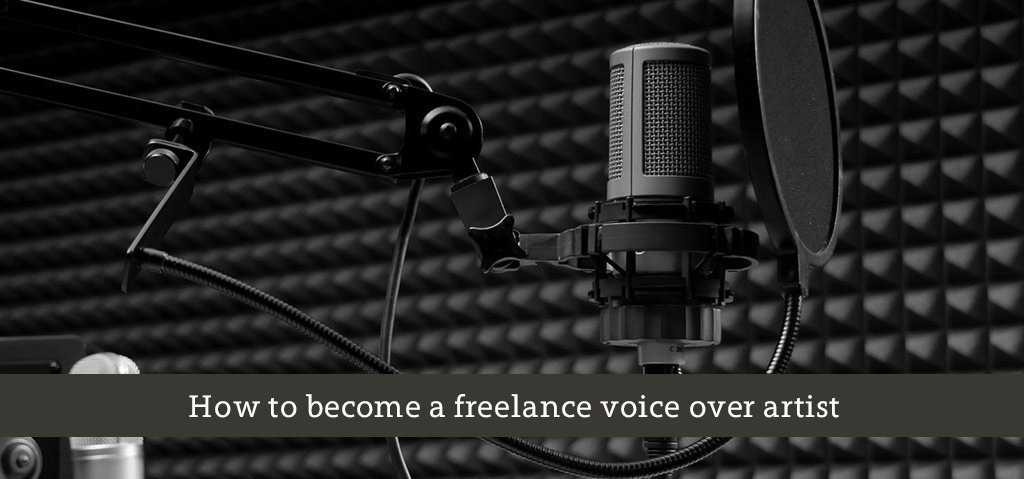
We have heard them in movies, cartoons, advertisements, everywhere—people behind the screen giving their voices to people or objects on the screen or otherwise. These behind-the-screen actors have their own share of excitement by working as voice-over artists, and this excitement gets doubled since they are paid for it. Yes, in this article, we will be talking about the prospects of freelancing as voice-over artists, and what can be done to ensure a stable and lucrative career in the same.
The freelance community is wide and universally accommodating. It started off with a few job options, but now provides hundreds of them in ample amounts. All you need to do is to study thoroughly about the kind of freelancing you wish to do. Hence, likewise, to become a freelance voice-over artist is to extensively study the points mentioned in this article before actually taking the freelance path.
Here Are A Few Things You Must Know And Do To Become A Freelance Voice-Over Artist:
1. About Voice-Over
Everyone around us can easily give a fair general idea of voice-over, but not many know the actuality of the same. Thus, many ideas are vulnerable to stereotypes or misinformation. If you seriously wish to become a standard voice actor, you must know what exactly voice-over is.
Voice over is essentially a production technique in which a voice is utilized in filmmaking, television production, theater, etc. A Voice-over is something which is generally read out from a script and is pre-recorded at times. Today, voice-overs are popular in documentaries, films, gaming, announcements, award presentations, and whatnot. All of this shows the wide array of opportunities in the field of voice over.
There are, however, certain job and other requisites which you must look out for.
2. Voice Over Job Opportunities
Let us be honest: You do not necessarily need to have professional qualifications to become a voice freelance artist. Many notable voice artists started without any professional qualification, and have it made big in the industry through hard work and experience. Nevertheless, the world is more competitive than ever, and the same naturally applies to the freelance universe.
Today, many companies, big or small, are looking for committed and talented voice artists, but not at the expense of quality. Despite voice-over being not a popular professional option, there are a few certifications one may get. These certifications will add to the portfolio of skills, and ensure you stand out amid the crowd.
There are institutes in India and abroad, which offer programs on voice-over, and some of them are grand and reputed. In India, the number of such options is meager but whatever options are available, they offer distinguishing quality education. Enroll in various voice-over programs offered, earn a shining certificate(s), and show off to the world.
Let us just say you do not want to get a professional certification, instead, you’d work hard and gain experience. Then, you should do this: create samples in which you are giving voice-overs and publish them online. Even if you find largely unprofitable job opportunities on voice-overs, take them and earn experience. The more experience you have, the better it is.
Whether you choose the professional way or not is up to you, but you are required to show your thoroughness in the voice-over techniques through your theoretical knowledge and magic of voice. After all, in this world of voice-overs, it is the voice that matters. If your voice fails to create the intended magic, you fail as a voice artist and as a freelancer.
3. Skills Needed
Let us get to the point: the skills. There are a number of skills a voice artist is expected to possess. Each one of them performs a fundamental role in voice-overs; therefore, you should hone each one them as much as possible.
The following are some of the skills required:
- Clarity: What good to becoming a voice actor if there is no clarity? By clarity, it is meant that the person must be able to pronounce each word clearly, without engaging in much annoying mumbling or swallowing. If you are unable to convey with clarity, then you will not stand a chance.
- Cleanliness: Clarity is one thing; cleanliness is another. When we say cleanliness, we mean to say that the artist must be able to speak with minimal mouth noise such as clicks, glottal stops, etc. Too much mouth noise affects clarity, which you know is fundamental to voice artistry.
Some ways to make your voice clean are hydration, throat sprays, munching, chewing gum, etc. - Consistency: We are talking about a must-have skill for any voice freelance artist.Consistency empowers voice-overs, and thus, you should possess it. It includes consistency in energy, volume, articulation, coordination, and whatnot.
- Connection: Voice overs are not just about dubbing or behind-the-scene voice covers; they require immediate connection with the object behind such voice-over. For example, if you are dubbing a character from a movie, and, let us just say, he is a bully, then you are expected to establish a connection with the character, and convey through voice the image of a bully. You must absorb the character into yourself and speak through it.
- Conversational: This means the artists must be capable of speaking and reading at a conversational pace. His/her voice must not sound robotic or unnatural to the setting. In order to do so, a voice artist often resorts to making facial expressions to communicate emotions.
- Control: Control drives a voice artist. The artist must maintain control throughout the dub; he/she must not hesitate or become nervous, or it will affect the quality of dub.
- Cold reading: If you are engaged in long narration, you must possess the skill of cold reading. This is the ability to scan quickly to make fair sense of the upcoming lines and avoid grammatical errors. This skill needs a lot of reading on the part of a voice artist, and therefore, you must routinely engage in self-conversational reading.
4. Voice Over Work
As a voice artist, you can work in a film and music production company, gaming industry, documentary, advertising companies, etc. All you need to is to do research about them. In India, foreign and regional language films are dubbed to suit the needs of the domestic audience. These movies are dubbed at various dubbing stations in the country, and many pay a hefty amount to voice artists.
If you prefer to work online, then things are relatively easy. There are multiple websites for voice artists offering job opportunities such as freelancer.com, guru.com, etc. These websites act as channels for the employers and voice artists to work together but remember this: there are many voice artists online and you must stand-out. How do you do that? The answer is simple: create a strong portfolio, provide voice samples, and wallah!
5. A Voice Sample
We have talked about job requirements, skills, working opportunities, but we have missed out on the samples. Whether you are a professional voice artist or not, you are required to keep close good voice samples. Even if you decorate your portfolio with glittering skills and experiences, the employer will most certainly ask for samples and you must be able to stand true to your claims.
So, how to do it?
- Aim: Do not randomly create a voice sample. Select a setting against which the voice over will be done. Let us just say, it is an advertisement for a jewelry company and accordingly create a sample.
- Dubbing software: You cannot simply record your voice on a mobile phone and send the sample to the prospective employer. In order to yield best results, download some good software, most of which are freely available online for download. These software ensure greater quality of voice, and isn’t this what the employers out there looking for?
- Length: Mind the time duration of the voice samples; do not make them unduly long as this might dry up the listener’s interest. Employers do not have too much time on their hands and therefore, make short but good voice sample.
- The background of the targeted employer: If you have applied to a film production company, avoid making unrelated samples such as product advertisements. Instead, make a sample which might evoke, let’s say, a romantic imaginary coming straight out of a movie. Similarly, if you are applying to a documentary production company, create a sample suiting to its requirements.
6. Voice Over Artist Salary
Much of the scale depends upon the present standing of the freelancer. If you are an experienced freelancer, you should keep your price level at or above prevalent market price since you command greater credibility than rookie freelancers. In case you are a fresher, begin with a reasonable pay rate, which may touch the prevalent market pay rate. To know more about the prevalent pay rate, engage with other voice artists for better understanding. For this, you can join various communities or discussion forums operating from different parts of the world. But, you may not necessarily need them since you are the best judge of your skills.
For more information, check out: What Are the Yearly Wages of a Voice-Over Artist?




